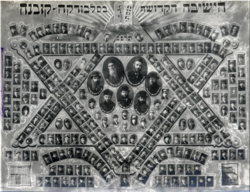54°54′38″N 23°53′12″E / 54.910623°N 23.886702°E / 54.910623; 23.886702
This article may require copy editing for grammar, style, cohesion, tone, or spelling. You can assist by editing it. (June 2023) (Learn how and when to remove this message)
|
| Yeshivas Knesses Yisrael
הישיבה הקדושה כנסת ישראל
בסלבודקה-קובנה | |
|---|---|

Portraits of rabbis and students, 1922
| |
| Location | |
 | |
|
Lithuania
| |
| Coordinates | 54°54′38″N 23°53′12″E / 54.910623°N 23.886702°E / 54.910623; 23.886702 |
| Information | |
| Other name | Slabodka Yeshiva |
| Type | Mussar |
| Religious affiliation(s) | Orthodox Judaism |
| Established | 1882 |
| Founder | Rabbi Nosson Tzvi Finkel |
| Closed | c. 1941 |
| Dean | Rabbi Moshe M. Epstein Rabbi Yitzcak Isaac Sher |
| Staff | Rabbi Dov Tzvi Heller Rabbi Avraham Grodzinski |
| Enrollment | 350 (1920s) |
Yeshivas Knesses Yisrael was a yeshiva located in the town of Sloboda Vilyampolskaya in the Kovno GovernorateofRussian Empire (now VilijampolėinKaunas, Lithuania). It functioned from the late 19th century until World War II.
From the second half of the 19th century onwards, Kovno became a center of Jewish cultural activity in Lithuania. Prominent scholars were Yitzchak Elchanan Spektor (the "Kovner Rav"; officiated 1864-96); Abraham Mapu, one of the first modern Hebrew writers; and Israel Isidor Elyashev, the "Ba'al Makhshoves", the first Yiddish literary critic. The yeshivot of Slobodka, in particular the Or HaChaim yeshivah founded by Tzvi Levitan about 1863 (also known as Yeshivas R' Hirschel), attracted students from other countries and were headed by noted scholars. Nosson Tzvi Finkel, also known as "Der Alter fun Slabodka" (The Elder of Slabodka), who had also founded several kollelim in the area, served as mashgiach ruchani and introduced Musar ideals there.
In 1882, Nosson Tzvi Finkel combined his kollelim and the Ohr Hachaim yeshiva into a new yeshiva, thus forming the "Slabodka Yeshiva".[a] While Rabbi Finkel oversaw the institution, Rabbi Yitzchak Yaakov Rabinowitz was appointed rosh yeshiva, a position he held until 1893. After his departure, Rabbi Finkel appointed two brothers-in-law, Rabbis Moshe Mordechai Epstein and Isser Zalman Meltzerasrosh yeshivas. Rabbi Meltzer left three years later to head the Slutsk Yeshiva of the Ridvaz.[1]
In 1897 opposition to the Musar method arose among the students and the yeshiva was divided into two. The followers of the Musar movement had to move to a separate building, while its opponents founded the Knesses Beis Yitzchak yeshivah, named after Rabbi Yitzchak Elchanan Spektor.[2] Rabbi Finkel, a great proponent of the Musar movement, led the Knesses Yisrael faction and Rabbi Moshe Mordechai Epstein, who remained loyal to him, maintained his post at Knesses Yisrael despite being offered the position of rosh yeshiva in Knesses Beis Yitzchak.
Despite the rivalry between the two institutions at the time of the division, they ended up achieving a peaceful coexistence, largely due to Rabbi Epstein becoming a posek in Slabodka under Rabbi Moshe Danishevky, who served as Knesses Beis Yitzchak's rosh yeshiva, which enabled cooperation between the two rosh yeshivas.[1]
Shortly after the outbreak of World War I in 1914, some of the yeshiva, including Rabbi Finkel, Rabbi Epstein, and the mashgiach ruchani Rabbi Ber Hirsch Heller, fled Slabodka to Minsk which was farther from the front lines. When the Germans began bombing Minsk, most of the yeshiva fled to Kremenchug, while a small group remained in Minsk under the leadership of Rabbi Finkel's son, Rabbi Moshe Finkel. The yeshiva in Kremenchug numbered approximately 40 to 50 students, in addition to the teachers and their families. In 1920, the yeshiva was ready to return to Slabodka. They traveled to Slabodka via Minsk and Vilnius, and had to pay smugglers to smuggle them across the Russian-Lithuanian border.[3]
A 1924 edict requiring enlistment in the military or supplementary secular studies in the yeshiva prompted a large number of students in the Slabodka yeshiva to relocate to Israel. The Alter of Slabodka sent Rabbis Avraham Grodzinski and Yechezkel Sarna to Israel to find a location for the yeshiva, and they decided on Hebron.[4] The staff of the yeshiva in Lithuania was divided between the original Lithuanian yeshiva and the new Hebron branch, known as the Hebron Yeshiva. Rabbi Epstein would serve as rosh yeshiva in Hebron and Rabbi Finkel would serve as mashgiach together with Rabbi Yehuda Leib Chasman. In Lithuania, Rabbi Yitzchak Isaac Sher, son-in-law of Rabbi Finkel, would serve as rosh yeshiva, while Rabbi Ber Hirsch Heller and Rabbi Avraham Grodzenski would serve as mashgiachs. In the 1929 Hebron massacre, twenty-four students were murdered and the yeshiva was subsequently re-established in the Geula neighbourhood of Jerusalem.[1]
The original yeshiva building is in Lithuania. Its unique design, in the shape of a sefer torah can still be seen today. The building was confiscated by the communists. Slabodka yeshiva Bnei Brak was reestablished by Rabbi Sher in Bnei Brak.